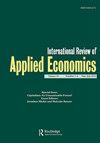Access to drinking water and sanitation in developing countries: Does financial development matter?
IF 1.6
Q3 ECONOMICS
引用次数: 0
Abstract
ABSTRACT The aim of this study is to examine the effect of financial development on access to safe water and sanitation. Using panel data from a sample of 106 developing countries over the period 2000–2019, empirical results based on two-step system generalised method of moments suggest that financial development improves access to drinking water and sanitation for the total population and for both urban and rural populations. In addition, financial development reduces the gap between urban and rural populations in terms of access to these two basic services. Further analysis also suggests that the financial market and financial institutions, as well as their sub-indices (financial depth, financial access, and financial efficiency), also improve access to water and sanitation. These results underscore the need for continued efforts to design and implement policies that promote financial development. In addition, given the greater impact of financial institutions, we suggest that reforms to improve the financial system should be more oriented towards the development of financial institutions.发展中国家获得饮用水和卫生设施:金融发展重要吗?
摘要本研究的目的是考察金融发展对获得安全饮用水和卫生设施的影响。利用2000-2009年期间106个发展中国家样本的面板数据,基于两步系统通用矩法的实证结果表明,金融发展改善了总人口以及城市和农村人口获得饮用水和卫生设施的机会。此外,金融发展缩小了城市和农村人口在获得这两项基本服务方面的差距。进一步的分析还表明,金融市场和金融机构及其分项指数(金融深度、金融准入和金融效率)也改善了获得水和卫生设施的机会。这些结果强调,需要继续努力制定和执行促进金融发展的政策。此外,鉴于金融机构的影响更大,我们建议改善金融体系的改革应更多地面向金融机构的发展。
本文章由计算机程序翻译,如有差异,请以英文原文为准。
求助全文
约1分钟内获得全文
求助全文
来源期刊

International Review of Applied Economics
ECONOMICS-
CiteScore
4.30
自引率
4.50%
发文量
37
期刊介绍:
International Review of Applied Economics is devoted to the practical applications of economic ideas. Applied economics is widely interpreted to embrace empirical work and the application of economics to the evaluation and development of economic policies. The interaction between empirical work and economic policy is an important feature of the journal. The Journal is peer reviewed and international in scope. Articles that draw lessons from the experience of one country for the benefit of others, or that seek to make cross-country comparisons are particularly welcomed. Contributions which discuss policy issues from theoretical positions neglected in other journals are also encouraged.
 求助内容:
求助内容: 应助结果提醒方式:
应助结果提醒方式:


